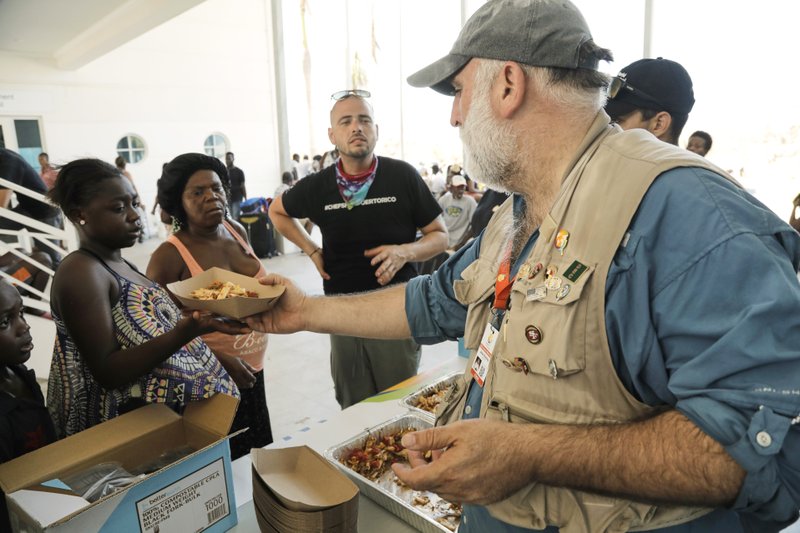Jay-Z’s Made In America festival canceled for the second year in a row
15 days ago

After earthquakes, as hurricanes blow and drench, when wildfires chew through neighborhoods and volcanoes spew deadly lava, look for a gregarious chef toting huge and mighty paella pans.
His name is Jose Andres, and he might just be changing some rules on how expedient food relief is distributed to victims of disaster when they need it the most: Now, not days from now.
The frank-talking Spaniard is a celebrity chef with two James Beard awards, nearly three dozen restaurants and four Michelin stars in his hip pocket. He also founded a nonprofit, World Central Kitchen, that has served nearly 10 million meals on the front line of emergencies since the 2010 earthquake in Haiti and, most recently, in the Bahamas.
“I cannot have my fancy restaurants and enjoy life and just stay home and watch TV when people are hungry and thirsty,” Andres told The Associated Press from New York, fresh from nearly three weeks of distributing food and clean water in the Bahamas.
He and his small organization often do it with the help of local cooks, via field kitchens using nothing more than propane tanks, the giant cast iron pans of his homeland and large containers built to keep thousands of hot meals warm for hours at a time.
They did it in Puerto Rico after Hurricane Maria. They did it in Texas, South Carolina and Southern California. They’ve done it in the Dominican Republic, Nicaragua, Zambia, Peru, Cuba, Uganda, Indonesia, Mozambique and Cambodia.
Andres and World Central Kitchen made their way to the Bahamas before Hurricane Dorian hit land, enlisting the help of the Nassau resort Atlantis, Paradise Island, that lent its industrial-size kitchen as home base. They provided hot meals, sandwiches, fresh fruit and water in the hardest hit areas to the north from the disaster’s onset, island hopping by helicopter as the stubborn storm churned for hours.
“I believe in the power of cooks like me coming together to fix a problem that the big NGOs and big governments are highly unprepared to respond to, which is the most important moment, one hour after the emergency happens,” Andres said Tuesday. “It’s the urgency of now.”
While in town for the United Nations’ annual gathering of world leaders, Andres, 50, is doing what he can to spread the message that food relief needs to be free of the constraints of bureaucracy and institutional red tape.
Andres met with former President Bill Clinton, like-minded philanthropists and Caribbean leaders this week about his experiences as a “first food responder.” He plans to return to the Bahamas as soon as he can.
The work of his organization, and many other small non-governmental players like it, isn’t cheap. World Central purchases all its food and gets around using whatever means necessary, whether yacht, seaplane, helicopter or truck. They’re often the first to arrive and the last to leave.
On Friday, World Central announced a new Climate Disaster Fund with the goal of raising $50 million to make its efforts even more nimble and adaptable hour by hour, a particular necessity when unforeseen issues arise.
In the Bahamas, the hotel where they had planned to stage food distribution in Abaco was heavily damaged, forcing them to cook about 100 miles (160 kilometers) to the south in Nassau and fly in the food.
The majority of World Central’s funding comes from individual donors offering $10 or less. The organization has a full-time staff of 25 and a broader circle of reserves, including a network of cooks and other volunteers willing to pack up and head out on a moment’s notice.
But key, said World Central’s executive director Nate Mook, is working with local people in hard-hit communities to help plan and untangle logistics, and to procure equipment and transport as cooking and food distribution ramp up.
“They know best what the needs are,” Mook said. “We hire local chefs and others to work with us because they know how best to leverage what resources there are on the ground.”
World Central doesn’t want to double down on efforts already underway. It looks for holes and heads straight to them. As relief turns to clean up and reconstruction, World Central trains local people to continue to help feed their communities.
In Haiti, the organization created a culinary school in Port-au-Prince, complete with a world-class, professional kitchen and a full dining room for hosting events.
Andres, choking up at times as he described the devastation in the Bahamas, is in it for the long haul as he strives to improve the way “zero hour” relief is handled.
“We need a major overhaul,” he said. “The future of relief must include NGOs that are highly specialized. It’s about less talking and more doing.”
Leave A Comment